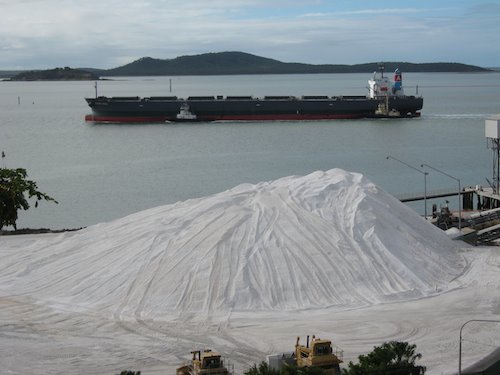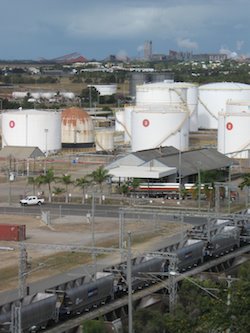The tourist board brochure claims that “Gladstone is a gourmet paradise…creating flavours you will remember long after your holiday”. We are not convinced. Apart from pub food (with an honourable mention to the Queens Hotel Steak House – see previous blog entry), and a scattering of rather second rate cafes, there are only a handful of real restaurants in town, and most of those are boarded up with ‘for sale’ signs on them. The list of ‘restaurants’ in that same tourist brochure even includes the McDonalds… and mysteriously fails to mention the one diamond in the rough, the stunningly good Rock Salt in Roseberry Street. When we showed up without a reservation on a weekday evening the place was packed, although they were perfectly happy to light up a gas heater and let us sit outside on the patio. The service was cheerful, the wine list and prices acceptable, and the food very good indeed. We’re counting our pennies to see if we can justify another visit before we leave.
We found a self-guided pamphlet tour of the town, which was only two kilometres long and took in all the historical attractions. Unfortunately, most of it reminded us of a similar tour that we once did in Shanghai, where we would find ourselves looking at a car park and admiring a small plinth stating “Here stands the former site of the former Korean embassy”. The main highlight is the climb of 111 steps alongside the Rotary Club artificial waterfall to the top of Auckland Hill (“Spectacular… multicoloured vistas of the city… magnificently preserved buildings from times gone by”), from which vantage point you get a good view of the mineral loader, the coal loader, the power station, both bauxite refineries and the smelter.
GRAIN SILOS FUEL AND HYDROXIDE
This encouraged us to take a number of the free ‘Industry Tours’, in which we were ferried every day by bus to a different plant site. The Queensland Alumina refinery was an interesting nest of pipework and towers, stained either bauxite red or alumina white depending on which part of the process was in progress. We weren’t allowed out of the bus or to take photos, but we did get to see behind the scenes that are not normally visible to the public. Bronwyn was particularly struck by the large quantities of junk lying around everywhere, and we couldn’t help noticing the phenomenal amount of welding and repair work that was going on. When there are hundreds of thousands of kilometres of pipework carrying hot caustic soda, I imagine that equipment doesn’t last very long. On the way in, a sign proudly proclaimed “Days since last serious injury: 2”
We also visited the Boyne Smelter, where the alumina is reduced using astonishing amounts of electricity to make aluminium ingots, bars and billets for export mainly to Asia. Once turned on, it’s a bad idea to turn the smelter off because the molten metal will set irreversibly in the crucibles, so there was a continual tale of keeping up the supply of electricity and making sure that they’ve made enough anodes to replace the ones that burn out every few days.
Another local industry is the RG Tanna coal loader that is the source of the black dust all over our deck. They take coal from bottom-dumping train cars, blend it, and then load it into bulk carriers at a rather amazing 6000 tonnes per hour. Our bus driver took us right out along the loading pier, where coal was pouring into ships from a conveyor moving at five metres per second… a barrage of statistics, but an interesting and enjoyable tour.

PASSING A CALCITE STORE ON THE WAY TO THE COAL LOADER
And now the week is over. I have sent in my final assignment, and Bronwyn has completed her final exam. We are free to go! There are nice SW winds forecast for the weekend. We’re fuelled up, watered up, provisioned up. I’ve hosed the coal dust off the deck (again). We’ve washed and polished and vacuumed, charged all our rechargeable stuff using shore power, finished colour coding the anchor chain, and reinstalled our tow generator. I’ve even – I think – fixed the ventilation problem in the head.
We leave on the dawn tide.

